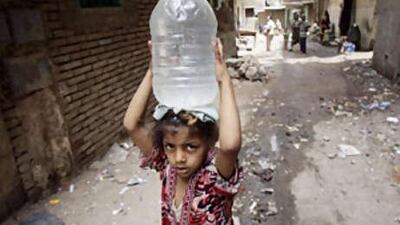NAIROBI // The Nile River gushes out of Lake Victoria at the town of Jinja, Uganda, before it begins its 6,650km journey north to the Mediterranean Sea. Here the foamy torrent is popular with thrill seekers, who ride the white water in rubber boats.
But a massive hydroelectric project is about to deflate the rafting industry on the upper White Nile. The Bujagali dam, a 250-megawatt project that is scheduled to come online next year, will provide Uganda with 70 per cent of its power needs but at the same time will cut into the rafting trips. "I hate to see the river trashed like that," said Patrick Klain, who recently rafted the Nile with Adrift Adventure. "It is unfortunate that they have to put the dam there. It is going to cut off some of the best rapids."
Adrenalin junkies make up just a small percentage of the people who are not thrilled by Uganda's Nile River projects. The government of Egypt is fiercely territorial over Nile water and is opposed to any upstream country altering the flow of the river. But the countries that share the Nile River basin - Uganda, Ethiopia, Kenya, Tanzania, Rwanda, Burundi and Democratic Republic of Congo - are tired of Egypt, and to a lesser extent Sudan, dictating the terms of the river water's usage. The upriver countries recently signed a water-sharing agreement more favourable to their interests that then created a diplomatic standoff with Egypt.
"Some people in Egypt have old-fashioned ideas based on the assumption that the Nile water belongs to Egypt," Meles Zenawai, the prime minister of Ethiopia, whose country has hydroelectric projects planned on the Blue Nile River, said in a televised interview. "The circumstances have changed, and changed forever." Egypt's claims to the river date to colonial-era treaties that granted the country the lion's share of the water and give it veto power over dams, pumping stations and irrigation works upstream that could reduce the river's flow. The arid country relies on the Nile for 90 per cent of its water needs.
The decision by the Nile basin countries to rework the agreement has set off a flurry of diplomacy as Egyptian cabinet ministers have met with their upstream counterparts to ensure that Egypt is not left out of the process. Despite the diplomatic rumblings downstream, Uganda's Bujagali dam is even more controversial inside Uganda. The dam, at a cost of US$860 million (Dh3.2 billion), is one of the costliest hydro projects in the world and will actually raise energy prices, according to the World Bank, which is partly funding the construction.
Environmentalists also have problems with the dam. Besides wiping out a popular whitewater rapid on the Nile, the dam will also destroy an area of biodiversity culturally significant to the local Busoga tribe, according to International Rivers, an advocacy group based in the US with representatives in Africa and around the world. "The dam will submerge a place with great cultural and spiritual importance for the Busoga people," the organisation said in a report. "The project will also directly affect the livelihoods of about 6,800 people, impact fisheries, and submerge highly productive agricultural land and islands of high biodiversity. Some villagers have already been resettled for the project, with poor results."
While Nile basin governments work to ease the diplomatic tension with Egypt, civil society groups want to be able to use Nile water without seeking Cairo's permission. Agripina Namara, the head of the Uganda chapter of Nile Basin Discourse, a group of stakeholders that influence development of the river, said the time is right to rework the water-sharing agreements. "With increasing populations, countries need to modernise their agriculture and they need water for irrigation," she said. "Other countries want to do hydro projects. Sometimes we think Egypt is being selfish. These agreements are very old. Now is the time to change them. There's no reason to have water shortages with all this water in our midst."
Ethiopia, which also claims a source of the Nile, plans to increase its power generation capacity 15-fold in the next 10 years through a series of dams. The country inaugurated the 460MW Tana Beles dam last week, which angered the Egyptians who saw it as a provocative act. Ethiopia's most controversial dam, the 1,870MW Gibe III dam, is on the Omo River and does not feed into the Nile. But Ethiopia has contracted feasibility studies for two massive dams along the Blue Nile that could generate a total of 4,000MW, enough to power at least four million homes.
And last year, a Chinese hydro company completed the Tekeze dam on a tributary of the Nile in western Ethiopia. It remains unclear who financed the $360m, 185-metre dam, the largest in Africa. A report from Probe International, a Canadian environmental advocacy group, said China financed the entire project. China often gives infrastructure financing in return for natural resources, such as oil, to feed its booming domestic economy, the organisation said.
"Subsidised-project financing is usually given for political reasons, not because an investment is economically viable," said Patricia Adams, the executive director of Probe International. "It usually distorts decisions and locks governments and consumers into ongoing costs. African governments would do better to let the discipline of the market choose projects that will truly generate enough wealth to pay investors back."
mbrown@thenational.ae

